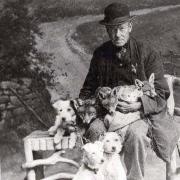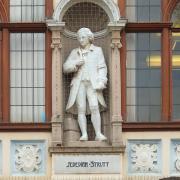David Marley speaks to the former Honorary Recorder of Derby and hears his memories of the county’s criminal justice system

IT IS almost one year since His Honour Judge John Burgess packed up his ceremonial wigs and gowns for a move to a new judicial role in Nottingham, having completed an eight-year term of office as the Honorary Recorder of Derby.
Since leaving his role as Derby’s most senior judge – and with it the responsibility of managing justice for a population of almost one million people – he confesses to missing many of the friends he made during his time in the county’s criminal justice system.
‘I have so many fond memories of my time in Derby,’ he reflects. ‘I look back at a fantastic period of time spent in what is one of the most welcoming courthouses in the country.’
However, there is one part of John’s time in Derby that he is delighted to say goodbye to – the grinding daily commute to the courtroom from his family home in Nottingham. ‘I may miss the people of Derbyshire, but trying to get to court each day for a nine-o’clock start was always a challenge,’ he smiles. ‘After 14 years travelling to Derby from Nottingham, firstly as an ordinary judge, then as resident judge, certainly means I do not miss navigating the joys of the A52 each day. It is pleasing not to have to do that now.’
As Resident Judge at Derby Crown Court he was responsible for presiding over some of the county’s most high-profile criminal cases, including the trials of murderers, sex offenders and thieves. He was also required to sentence hundreds of convicted criminals, frequently handing down a range of punishments, including terms of imprisonment, rehabiltitation orders, community-based penalties and fines. Last year, his final act as Recorder of Derby was to attend his own farewell celebration, known in the legal profession as a valedictory.
Dozens of solicitors, barristers and court administrators marked the contribution of the Judge to the legal system in a packed courtroom at Derby Crown Court. ‘Everyone was so kind; and it was so very touching,’ he recalls. ‘Derby courthouse remains a small, intimate place with a lot of the staff having worked there for many years; everyone knows each other well and I liked that.’

In 2008 he was made the Resident Judge of Derby Crown Court and in the following year he was appointed Honorary Recorder of Derby, after Derby City Council decided to revive the historic post. ‘The Office of Honorary Recorder was established in the 1970s but for some reason the local authority never availed itself of the post,’ he explains. ‘The idea of the post was to bring a stronger link between the institutions of the City of Derby and the Court. It was an honour to take up the first appointment.’
In accepting the post, he quickly embraced all of the civic aspects of the office. ‘It is important to remember that the court must be independent, but it is also good for it to retain a link to the council – and we came together to celebrate and mark certain occasions,’ he says.
As Resident Judge he attended the county’s Legal Service at Derby Cathedral – which involves taking part in a procession followed by a religious service under the leadership and direction of the High Sherriff of Derbyshire. He also took part in the swearing in of new magistrates.
In addition, as Honorary Recorder of Derby, he participated in a number of ceremonial events. ‘I attended other services including the Maundy Service as the Recorder of Derby,’ he explains.
Reaching one of the highest offices of the criminal justice system in Derby was never on the career plan of the young John Burgess growing up in the city of Oxford in the 1960s and 70s. And he confesses to ‘falling into the legal system’ after completing a law degree at the University of Exeter.
‘At the age of 17 I really was not sure of what I wanted to do when I grew up,’ he says. ‘At the time I was not actually doing law at school, I was only thinking about it. It was my house-master who suggested that I go down to the local Crown court to see what went on in there.’

He was fascinated by the legal process and decided to read law at the University of Exeter. ‘At the conclusion of my studies my tutor encouraged me to do my bar finals – and this placed me in a good position as I now had a postgraduate qualification, which I could use to practice if I wished.’
After completing his training in London, he travelled to Nottingham to join a barristers’ chambers. ‘I had just completed my pupillage at a chambers on the fringes of Middle Temple, near the Royal Courts of Justice, and I was delighted to be asked to join a chambers in Nottingham,’ he remembers.
For the next 15 years he worked out of two chambers in Nottingham – 24 The Rope Walk and then later at 1 High Pavement – and he built an impressive reputation as an effective advocate in the Crown court. However, it was only after one-and-a-half-decades in the combative and adversarial atmosphere of Nottingham’s courtrooms that John realised that he wished to become a judge.
‘When I started out as a barrister I did not think that I would become a judge on a full-time basis,’ he explains. ‘In my final seven years as a barrister I was given the opportunity, for about three to four weeks each year, to sit as a part-time judge, known as a “recorder” – and I really enjoyed the chance of ensuring that fair play occurred during criminal proceedings. During this time I realised that I enjoyed the role of the judge; as well as growing to believe that I may be better suited to this role rather than as an advocate,’ he recalls. ‘One of the most satisfying aspects of the role of a judge is that you don’t have to take part in the daily barrister versus barrister fight to win – you can actually focus on seeing that justice is being done, and I really enjoy that.’
To Judge Burgess the ability to set the tone and atmosphere in the courtroom is key to achieving this. ‘It is really important that the court should achieve a sense of dignity – but it does not have to be a place where people are totally frightened,’ he says. ‘I believe people work at their best when they are relaxed. If people are terrified of making a mistake, they will not do themselves justice – and that includes barristers, court staff and jurors; as well as the victims and witnesses who come to court to give evidence.’
Many years earlier Judge Burgess recalls prosecuting a case involving a 7-year-old witness. ‘The boy was so small he could not give his account from the witness box, so he had to give it in front of the box. Looking back this was wholly unsatisfactory,’ he says.

Since then the Government has introduced numerous special measures to improve how young and vulnerable witnesses give evidence in court – including the use of television links and enabling victims to make statements from behind screens.
On taking up a full-time appointment to the judiciary, Judge Burgess split his legal time between the courts of Derby, Leicester and Nottingham, before taking up a permanent post in Derbyshire as the Resident Judge at Derby Crown Court in 2008.
One of the most sensitive aspects of his new role as the senior judge is Derby was the sentencing of convicted criminals.
‘Sentencing a person comes with a heavy responsibility. Sometimes the answer can be straightforward, as we now have lots of guidelines and many cases do fall into particular categories for sentencing,’ he explains. ‘But on other occasions, you really do agonize. I suspect that not everyone appreciates how difficult this can be – it is important you take into account how the victim feels; what mitigation there is to be considered; as well as trying to understand what drove the offender to do such a crime,’ he explains.
‘We know, as judges, that we are human – but sometimes we forget that other people may not see us as so. Citizens often simply do not know what happens inside a Crown court and we could do so much more to increase the public’s understanding of how our justice system works.’
To help increase awareness of the role of the court, Judge Burgess was always pleased to enhance the public’s understanding of the role of the court during his time in Derbyshire. ‘I was delighted to answer people’s questions – and frequently did so,’ he says. ‘I was happy to listen to members of the public gallery during breaks in proceedings and we also welcomed hundreds of students and school children to the courts of Derby to give them an insight into what we did.’
Two years ago, Judge Burgess took part in the annual Bishop of Derby’s Parliament Week. The event, held at Derby Cathedral, explained how laws are made and a series of sentencing exercises took place where students from local schools and the University of Derby had to listen to the evidence and then decide on a judgment. Judge Burgess has welcomed numerous other groups into his courtroom, including a local Derbyshire branch of the Women’s Institute. ‘I was really touched that after the event they sent me a card to thank me for welcoming them,’ he smiles.
The legal system, which is steeped in tradition and precedent, is often slow to change – but the growth of technology is having an impact on the activities of the modern day courtroom. ‘The advent of social media has now reached the door of the courtroom – I now have to inform jurors that it is a contempt of court offence to broadcast and discuss confidential activities of the court on the internet. This is something I would never have had to consider in the past,’ he acknowledges.
Increasingly, barristers working in the courtrooms can be seen working from computer tablets and asking questions from notes prepared using digital technology. ‘Many barristers are now preparing indictments (a list of offences to be heard in the court) on tablets and they are adapting very well to these changes,’ he says.
The range of offences Judge Burgess presided over at Derby Crown Court also changed during his time in post. ‘In the early 2000s you still used to see the odd case of car radio theft and ram-raiding,’ he says. ‘Today this has completely changed, with a great volume of offences now occurring online – including the abuse of young people and the sharing of child pornography. Now all cases are in a digital format.’
Maintaining order in the courtroom is a key part of his judicial functions. ‘It is important to remember that after a trial there can be a lot of emotion in the courtroom, especially as a verdict is about to be given by the jury,’ he explains. ‘For the family of a victim and the family of the offender, they have a huge amount invested in the outcome of the trial – and it is understandable that emotion can play a part. I have on occasions had to ask people to sit down and be quiet – but in the 14 years I presided in the courts of Derby I only had to use my contempt of court powers on three occasions.’
The growth of criminal justice legislation has seen the powers of a judge expand in recent times. ‘Two hundred years ago, a judge really only had three sentencing options – a jail sentence, deporting an offender, or execution,’ he says. ‘Today we have so many more tools and sentencing powers to bring justice and assist with the rehabilitation of the offender.’
As part of regular drug treatment and rehabilitation reviews at court, Judge Burgess takes pleasure in seeing the transformation of the lives of drug-users. ‘I take great satisfaction in shaking the hand of a drug user who is working towards becoming a more healthy person, free from drugs, and heading in the direction of taking control of their lives – with the ultimate aim of making a positive contribution to society.’
He is also quick to praise the bravery of those people in Derbyshire who came forward to give evidence at court during his time there. ‘One of the most satisfying aspects of my role in Derby as Honorary Recorder was to take part in the High Sherriff’s Award presentations,’ he says. ‘Giving awards to people who have come forward to give evidence in court in special circumstances, and to those individuals who have done something to prevent crime in the county was one of the highlights of my time in Derbyshire.’
In private moments in between his judicial service in the courts of Derby, he enjoyed building strong bonds with a succession of high sheriffs. He regularly took part in a number of fundraising efforts for nominated charities and voluntary groups. ‘I was always impressed with the contributions of the High Sheriffs of Derbyshire and I recall taking part in one of David Coleman’s (former High Sheriff of Derbyshire and an ex-chief constable of the county’s constabulary) walks around the boundaries of Derbyshire and I was delighted to do so,’ he recalls.
Judge Burgess continues his valuable work presiding over a range of criminal trials at Nottingham Crown Court. He does so with great calmness and control, ensuring that all those who attend his court are free to participate in one of the most positive court atmospheres in the East Midlands.
‘The types of offending I see before me each day may be similar to those I dealt with in Derby – but I will always have so many happy memories of my time in Derbyshire, and for that I will be grateful,’ he smiles.



























